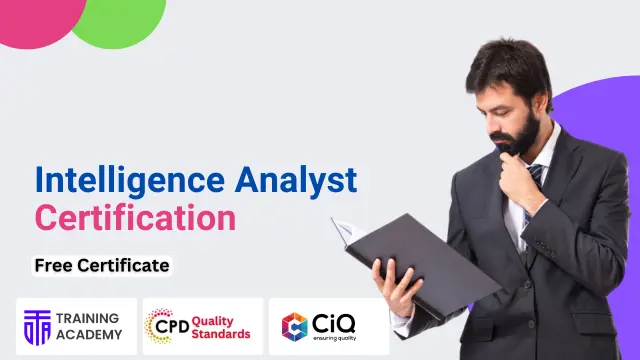
Intelligence Analyst Certification
CPD Accredited ! Free Certification | FREE Retake Exam | Lifetime Access | No Hidden Fees
Online Training Academy
Summary
- Digital certificate - Free
- Reed Courses Certificate of Completion - Free
- Tutor is available to students
Add to basket or enquire
Overview
Are you ready to dive into the world of intelligence analysis and make a significant impact in national security and beyond? Our comprehensive Intelligence Analyst Certification is designed to equip you with the essential skills and knowledge needed to excel in this critical field.
Key Features:
- CPD Certified
- Free Certificate from Reed
- CIQ Approved
- Developed by Specialist
- Lifetime Access
Certificates
Digital certificate
Digital certificate - Included
Reed Courses Certificate of Completion
Digital certificate - Included
Will be downloadable when all lectures have been completed.
CPD
Curriculum
Course media
Description
In the Intelligence Analyst Certification course, learners delve into the fundamental aspects of intelligence analysis. They start by understanding the essence of intelligence analysis, its historical evolution, and current best practices. The course emphasizes the intelligence cycle, teaching how information is gathered, processed, and disseminated to support decision-making. Participants learn about their roles and responsibilities as analysts, honing critical thinking skills and techniques for organizing information effectively.
Legal and ethical considerations in intelligence operations are also covered, ensuring analysts understand boundaries and responsibilities in their work. Lastly, the course explores the broader context of intelligence in national security, highlighting its importance and impact on policies and strategies. Overall, learners gain comprehensive knowledge and skills necessary to perform effectively as intelligence analysts in various professional settings.
Course Curriculum
- Module 01: Introduction to the Course
- Module 02: Defining Intelligence Analysis
- Module 03: Development of Intelligence Analysis
- Module 04: Intelligence Analysis and Best Practice
- Module 05: The Intelligence Cycle
- Module 06: Your Role, Responsibilities, and Functions as an Analyst
- Module 07: Critical Thinking and Structuring
- Module 08: Legal Issues and Ethics
- Module 09: Intelligence and National Security
Learning Outcomes:
- Understand the fundamentals of Intelligence Analysis and its historical evolution.
- Apply critical thinking techniques to structure intelligence reports effectively.
- Comprehend legal and ethical considerations in the context of intelligence operations.
- Demonstrate proficiency in the Intelligence Cycle and its application in practice.
- Identify roles, responsibilities, and functions within the scope of intelligence analysis.
- Analyse the relationship between intelligence and national security issues.
Who is this course for?
- Individuals aspiring to work in intelligence-related governmental departments.
- Professionals seeking to enhance their analytical skills in national security contexts.
- Graduates aiming to start a career in intelligence analysis roles.
- Military personnel transitioning to civilian intelligence roles.
- Law enforcement officers interested in intelligence gathering and analysis.
Career path
- Intelligence Analyst
- Counterintelligence Officer
- Risk Assessment Analyst
- Security Intelligence Specialist
- National Security Analyst
- Cyber Intelligence Analyst
Questions and answers
Currently there are no Q&As for this course. Be the first to ask a question.
Reviews
Currently there are no reviews for this course. Be the first to leave a review.
Legal information
This course is advertised on reed.co.uk by the Course Provider, whose terms and conditions apply. Purchases are made directly from the Course Provider, and as such, content and materials are supplied by the Course Provider directly. Reed is acting as agent and not reseller in relation to this course. Reed's only responsibility is to facilitate your payment for the course. It is your responsibility to review and agree to the Course Provider's terms and conditions and satisfy yourself as to the suitability of the course you intend to purchase. Reed will not have any responsibility for the content of the course and/or associated materials.


